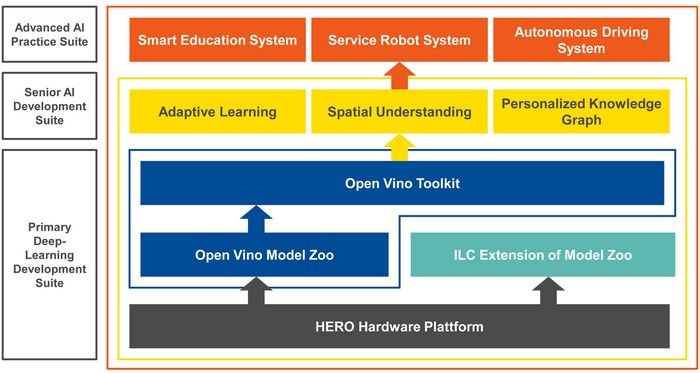Making the robotic edge modular
congatec modules drive Intel Labs China’s Robot 4.0 platform for research and education

Hardware visuals
Intel Labs China has chosen congatec COM Express modules for its Heterogeneous Extensible Robot Open (HERO) platform as they make it easy and efficient to design-in flexibly scalable processor technology. Created by the Autonomous System Lab of Intel Labs China to simplify and accelerate the development of next-generation IoT connected service robots, retail robots, and self-driving vehicles, the Robot 4.0 platform integrates artificial intelligence (AI) for research, education and experimental purposes.
Scalable Platform for OpenVINO™ AI toolkit
The open platform combines Intel’s heterogeneous processor technology with Intel’s OpenVINO™ AI toolkit and offers a comprehensive suite of software libraries for localization, navigation, planning, and human-robot interaction. In this environment, the congatec COM Express modules are now providing the demanded performance scalability from low-power Intel Atom® to high end Intel® Xeon® processors. The standard platform configuration utilizes conga-TC370 Computer-on-Modules with 8th Generation Intel® Core™ SoC processors.
Mastering new challenges
The global robotics market reached 23.7 billion USD in 2020 and is expected to grow to 74 billion USD by 2026 with an average growth rate of about 20%[1]. For the market to continue this strong growth, robots need greater flexibility and autonomy, as well as fast configurability to expand the range of tasks and applications. This requires massive computing power with the lowest possible latency, which makes real-time edge computing a key technology.

"HERO is a compact and heterogeneous low-power, high-performance system platform solution that the Intel Labs China built specifically for the development of intelligent robots – such as service robots, retail robots, self-driving cars, etc.," says Dr. Song Jijiang, VP, Director of Intel Labs China "After three years of continuous development, and thanks to the heterogeneous and open approach, HERO is now a perfect development platform for a wide range of Robotics 4.0 projects. Going forward, the Intel Labs China will continue its focus on the four main areas of artificial intelligence, intelligent transportation, wireless data communication and service robotics, collaborating with industry, universities and research partners to fully leverage the value of data and jointly drive the digital transformation of industry."
“We are excited to be an elementary part of Intel Labs China’s HERO ecosystem. Robotics 4.0 is a truly progressive and forward-looking technology area, especially in combination with AI and the OpenVINO toolkit that facilitate the optimization of a deep learning model on Intel’s heterogeneous computing hardware,” says Becky Lin, Country Manager China at congatec. “This is where the congatec COM Express modules really demonstrate their potential since flexible edge computing platforms are a paradigm of Robotics 4.0.”
Requirements for Robotics 4.0
Besides the computing hardware, Intel Labs China equipped its HERO education kits with the Advanced AI Practice Suite, which includes libraries for basic perception, interaction, navigation, planning, and manipulation. An optional Senior AI Development Suite adds adaptive interaction and continuous learning, including 3D semantic scene understanding. The HERO platform can also be extended further as needed. For example, the heterogeneous computing platform can incorporate an Intel® Arria® 10 GX FPGA or other third party hardware acceleration modules. The adaptive learning part can be expanded with additional perception modules to enhance existing or add new perception functions. This way, robots can quickly and flexibly be adapted to the different requirements of their future missions. Additionally, the modular hardware also enables application-specific load and performance balancing.
Proof of the HERO concept
The versatile congatec COM Express modules allow the creation of reliable and optimized robotic systems for a multitude of applications while simplifying system integration. This independent, scalable and future-proof modular platform gives HERO designers more time to focus on the development of innovative robotic systems.

